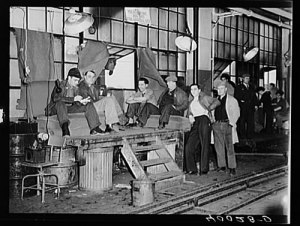
One of the things that I find most troubling with the public’s attitude towards government is the misunderstanding of what the government is, what it is for, and how it was designed to be used.
We elect representatives to protect our rights, as enumerated in the Constitution, but that are deemed innate among each of us, simply be virtue of being alive. If we strictly adhered to the Constitution, that’s pretty much all government would do.
Then, for reasons I can find little logic to justify, we let them do other things like carry the mail, administer health care, manage our retirement, and even study the effect of pot on a man’s most prized appendage.
With that in mind, I’d like to remind people what our forefathers intended for government: it is essentially an extension of you. We pay our government officials to do things that we can’t be bothered to do ourselves because we don’t have the individual resources, money, time, or expertise. Everything the government does, is literally done at your behest.
Below are a few glaring examples of where government has overstepped its Constitutionally-defined bounds. But using these examples, I’m sure you can think of many more; which is why I have a “comments” section below this post. Please, spout off at your leisure.
For those of you, like me, that do not use recreational drugs such as marijuana, I have a bit of information that may surprise you: I solemnly swear to you that you have several acquaintances that smoke marijuana. If you’re a realist, you already know this. But if you’re a prude, you’re saying, “I would never be friends with someone like that.” I promise if you are the latter, you are indeed friends with someone like that—they just know you’re a prude and bite their tongue to avoid your reaction.
So imagine that this person happens to be your favorite neighbor, which it probably is, because trust me when I tell you that marijuana users can be quite entertaining. Now imagine if you knew they were smoking it next door. Would you go over, barge in, put a gun to their head, and demand they stop immediately or you’ll use deadly force?
I’m guessing your answer is no.
Conversely, if you knew your favorite neighbor were over there molesting a child or murdering their spouse, unless you’re the most depraved of individuals among us, you would not hesitate to intervene and potentially stop them with deadly force.
So the difference is obvious. One is a personal choice without a victim. One is a blatant infringement on someone’s right to life and liberty.
So if you insist on making something illegal, at least hold yourself to a standard that says you would intervene yourself if there were no such thing as government to do it for you. Because in both the above scenarios, if you call 911, people with guns will shop and potentially use lethal force on your behalf.![Utah-DPS-SWAT[1]](https://logicallibertarian.com/wp-content/uploads/2014/09/utah-dps-swat1.jpg?w=300&h=225)
The other issue is a little more subtle, yet equally troubling; tolerating things you wouldn’t dream of tolerating if it were done to you personally.
Imagine you had a nice house with an unused extra bedroom. A friend of yours is down on their luck, lost their job, and can’t afford the apartment they’re currently in. So you offer to let them stay at your place rent free because you’re a good person, and you believe that it will be a short-term cohabitation.
The days turn into weeks, then months. You even tell your friend about some job leads you’ve heard of that you know he could do, but your friend’s answer is always the same.
While I’m living here off of you and not paying anything, I’m going to ride it out for my ideal job. I could take a lesser job for now in order to earn something while looking for a better job during my off time, but I’d rather not.
Is there anyone among you that wouldn’t grab that freeloader by the scruff of their neck, bury your foot in their salad shooter, and tell them never to come back? I’d be furious! Yet we all allow this to happen every single day with unemployment insurance. That’s your money they’re living off of! Many could work and take a less optimal job, but they choose not to while there’s “free money” just lying around.![freeloader-beer-2[1]](https://logicallibertarian.com/wp-content/uploads/2012/12/freeloader-beer-21.png?w=258&h=300)
If you read my previous post about privatizing everything, and you think I’m onto something, then maybe it’s time to do some serious blue sky thinking and look at getting rid of government subsidized unemployment insurance in favor of a private version.
You may point out that no one offers private unemployment insurance. Ss far as I know, you’re likely be right. But that’s only because the government has a monopoly on it; and therefore private insurers aren’t bothering to even try. You’re being pilfered for the government’s unemployment insurance, so why would anyone pay additionally for a private option on top of that since opting out of Uncle Sam’s isn’t allowed? 
I propose that we demand the government give people their money back and let them use that money to buy private insurance if they want, or live with the consequences of that risk if they choose not to. Liberty doesn’t just mean you have the right to have fun and enjoy life, it also means you have the right to gamble and fail. I will never acknowledge someone was successful if there was no risk of failure to begin with.
One thing I know about the private sector is this. If there’s a market for something, there’s an entrepreneur willing to provide it for a fee. If you get rid of the government monopoly on such things, private insurers would surely offer unemployment insurance for a nominal fee. Likely for less than the government does, and with far less waste and abuse.
So remember, if you wouldn’t do it yourself if you could, don’t ask government to do it for you.



